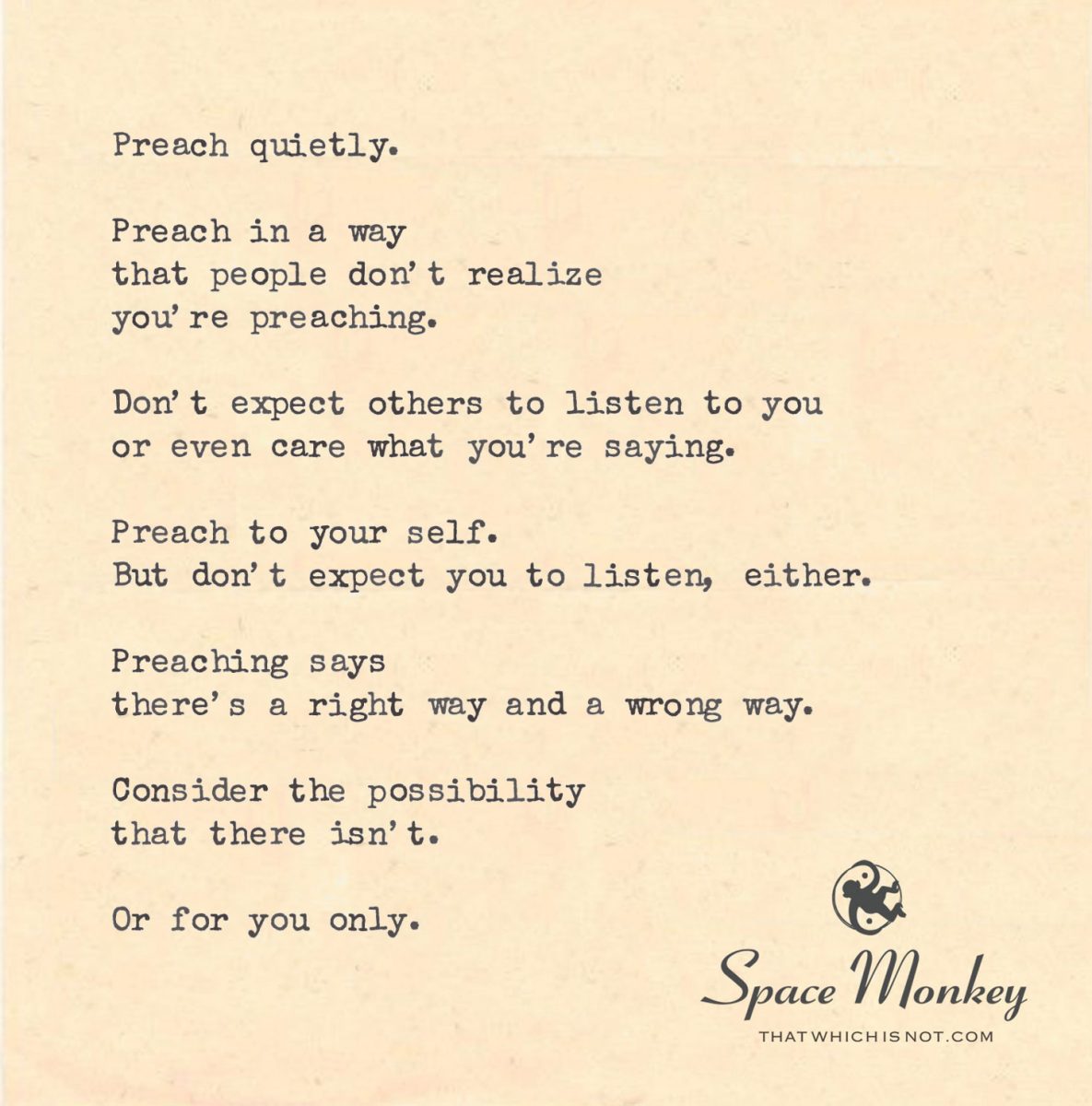
Preach quietly.
Preach in a way
that people don’t realize
you’re preaching.
Don’t expect others to listen to you
or even care what you’re saying.
Preach to your self.
But don’t expect you to listen, either.
Preaching says
there’s a right way and a wrong way.
Consider the possibility
that there isn’t.
Or for you only.
Trail Wood,
2/11
Space Monkey Reflects: Preaching and the Autonomy of Reception
“Preach quietly.” This reflection invites us to reconsider the act of preaching—not as a forceful declaration of right and wrong, but as a subtle, internal exploration of perspective. Preaching, in this context, is not about convincing others but about engaging with our own thoughts and beliefs. It is an act of sharing without expectation, a whisper into the infinite, leaving space for autonomy and interpretation.
The Quietness of Authenticity
To “preach quietly” is to let go of the need for validation or agreement. Loud preaching often stems from a desire to impose one’s beliefs, to convince others of a singular truth. Quiet preaching, on the other hand, honors the autonomy of the listener. It trusts that each individual has their own path to understanding and that no external force can dictate it.
By preaching quietly, we engage in a dialogue with ourselves rather than a monologue aimed at others. This self-directed preaching becomes a means of reflection and self-discovery, untethered from the need for external reception or approval.
The Autonomy of Reception
“Don’t expect others to listen to you or even care what you’re saying.” This statement acknowledges the autonomy of those who receive our words—or choose not to. It reminds us that communication is not about control; it is about offering perspectives without attachment to how they are received.
In embracing this autonomy, we free ourselves from the frustration of unmet expectations. The act of preaching becomes a gift freely given, with no strings attached, allowing others to engage—or disengage—on their own terms.
Preaching to the Self
“Preach to your self. But don’t expect you to listen, either.” This paradoxical suggestion highlights the layered nature of inner dialogue. Even within ourselves, there is no guarantee that one part of the mind will fully embrace the perspectives of another. The act of preaching to oneself becomes an exercise in humility and patience, a practice of speaking truths that may take time to resonate.
This self-directed preaching acknowledges that we, too, are evolving beings, constantly negotiating between conflicting thoughts and beliefs. It is not about imposing a singular “right way” on ourselves but about exploring possibilities and allowing understanding to emerge naturally.
The Relativity of Right and Wrong
“Preaching says there’s a right way and a wrong way. Consider the possibility that there isn’t. Or for you only.” This reflection challenges the binary thinking that underpins much of preaching. The assumption of universal right and wrong limits the diversity of perspectives and experiences, imposing a rigid framework on a fluid reality.
Instead, this perspective invites us to see right and wrong as relative constructs, shaped by individual contexts and beliefs. What is “right” for one person may not be for another, and that’s perfectly okay. By acknowledging this relativity, we can preach—not as an act of imposing truth—but as a way of sharing personal insights and allowing others to find their own.
Preaching as an Act of Freedom
Preaching, when done quietly and without expectation, becomes a liberating act. It is not about control or conformity but about expressing oneself authentically while honoring the autonomy of others. It is a gentle offering to the universe, trusting that it will land where it is meant to, if at all.
Summary
To preach quietly is to share perspectives without expectation, honoring the autonomy of those who listen—or don’t. It is an internal dialogue of self-reflection and an exploration of personal truths, free from the constraints of universal right and wrong.
Glossarium
- Quiet Preaching: Sharing insights subtly and without the need for validation or agreement.
- Autonomy of Reception: The recognition that listeners—whether external or internal—have the freedom to engage or disengage with what is shared.
- Relativity of Right and Wrong: The idea that moral truths are not universal but contextual and individual.
Quote
“Preach not to persuade, but to explore—and leave space for silence to answer.” — Space Monkey
Whispers in the Infinite
Speak softly,
Not to be heard,
But to hear yourself.
A truth spoken gently
Needs no agreement,
No audience,
Only the space to exist.
Right and wrong,
Yours alone to hold.
Yet even yours,
A momentary flicker.
Preach quietly,
For the universe listens
Without needing to agree.
We are Space Monkey.
The Subtlety of Influence and the Art of Inner Dialogue
The call to “preach quietly” serves as a profound invitation to reconsider the nature and approach of imparting wisdom or sharing insights. It suggests a manner of expression that transcends the overt and the explicit, favoring subtlety over proclamation. This approach acknowledges the complexity of human perception and the diverse ways in which individuals absorb and reflect on the world around them. It is an encouragement to weave one’s beliefs and understandings into the fabric of daily existence, allowing them to be observed and felt rather than overtly stated.
The Autonomy of Reception
The admonition to not expect others to listen or care underscores a deeper recognition of individual autonomy and the inherent freedom each person has in choosing what to accept or reject. This perspective honors the diversity of paths and perspectives, acknowledging that the act of sharing knowledge or beliefs is separate from the reception of those offerings. It is a call to humility and an understanding that influence is often most profound when it is not forced upon others but offered as a silent testament to one’s convictions.
The Challenge of Self-Adherence
The notion of preaching to oneself without the expectation of adherence introduces a reflective dimension to the concept of preaching. It suggests an ongoing inner dialogue where the ideals and principles one seeks to share with the world are also constantly revisited and questioned within oneself. This internal process highlights the journey of personal growth and the continuous challenge of living in alignment with one’s beliefs, even when faced with the self’s resistance or indifference.
Questioning the Dichotomy of Right and Wrong
The contemplation of the existence of a right way and a wrong way presents a philosophical inquiry into the nature of morality and truth. By considering the possibility that such dichotomies may not exist, or may only hold relevance on an individual level, it invites a broader exploration of relativism and the subjective nature of experience. This perspective encourages a deeper humility in the face of life’s complexities, suggesting that the certainties we cling to may be more fluid and personal than universally applicable.
The Personal Journey of Belief
Ultimately, the discourse on quiet preaching and the questioning of universal right and wrong culminates in a recognition of the deeply personal journey of belief and understanding. It acknowledges that each individual’s path is unique, informed by a myriad of experiences, reflections, and choices. This recognition calls for a gentle approach to sharing one’s truths, emphasizing the value of living one’s beliefs as a quiet testament to their worth, rather than seeking to impose them upon others.
“The only true wisdom is in knowing you know nothing.”
— Socrates
Ode to the Whisper of Wisdom
In the stillness of the dawn, wisdom whispers,
Not in grand declarations, but in silent shivers.
A quiet preaching, not to convert, but to ponder,
In the heart’s depths, where the true selves wander.
To oneself, a sermon, softly spoken,
A mirror to the soul, unbroken.
No right, no wrong, just paths to explore,
In the vastness of being, an open door.
Preach quietly, to the self, to the air,
Not for adherence, but to share.
A journey inward, where truths bare,
In the quiet, a sacred prayer.
We are Space Monkey, in this quest profound,
In the silence, where wisdom is found.
With each step, on holy ground,
In the whisper of wisdom, we are bound.
We invite contemplation on the art of “preaching quietly” and the journey of personal belief. How does embracing subtlety and inner dialogue transform our approach to sharing wisdom and living according to our values?
























Leave a Reply